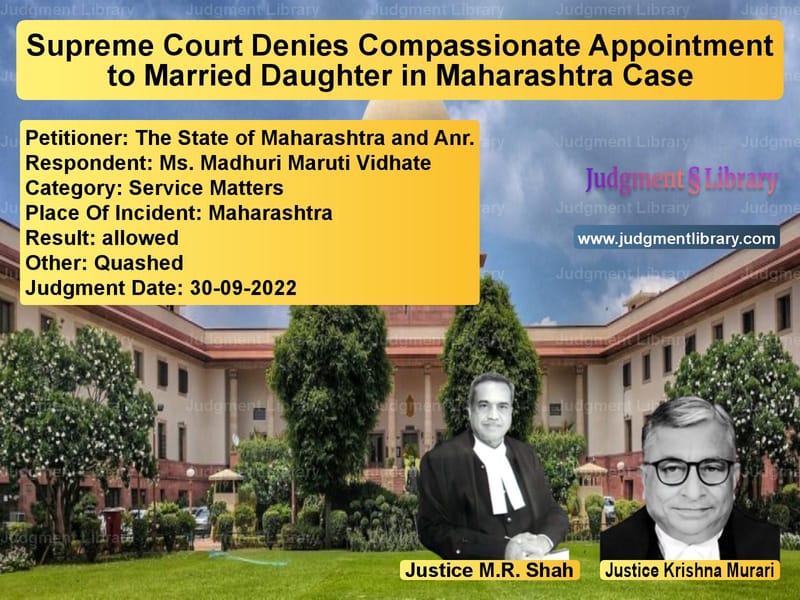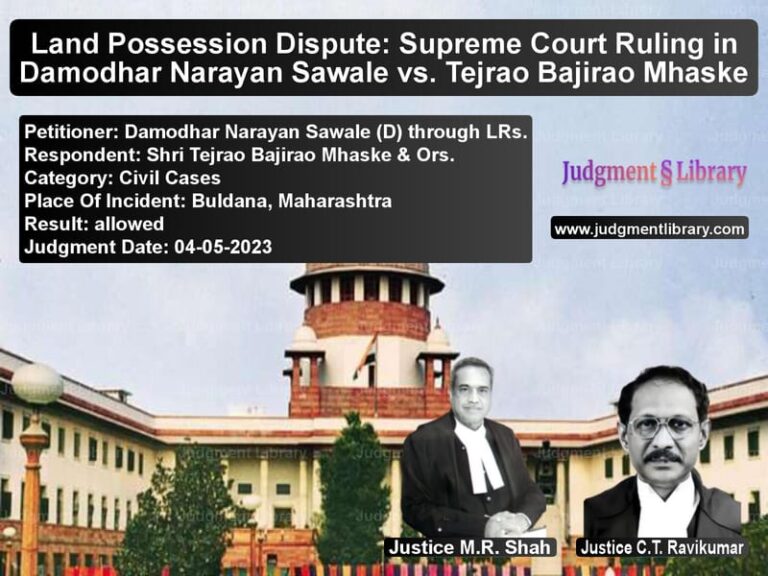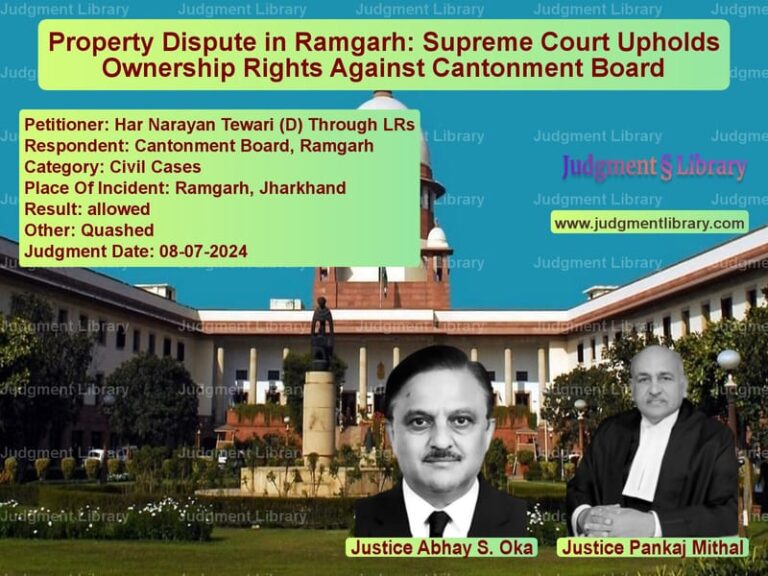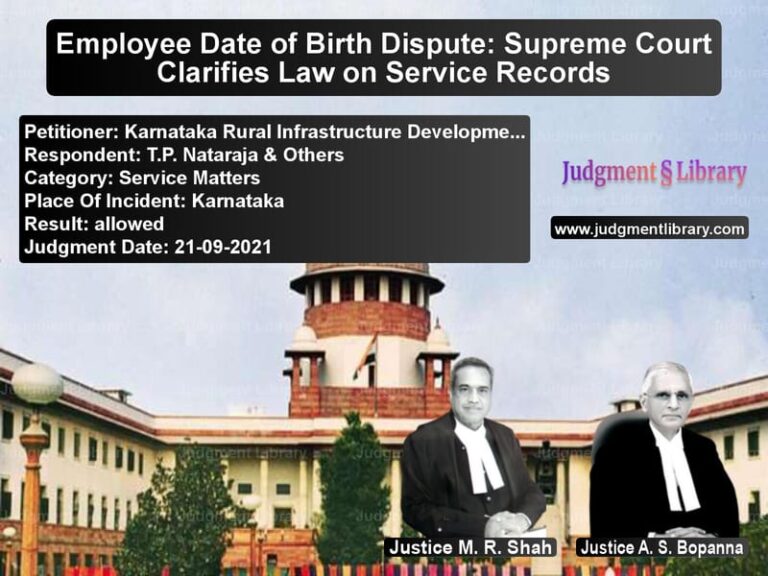Supreme Court Denies Compassionate Appointment to Married Daughter in Maharashtra Case
The Supreme Court of India recently ruled in the case of The State of Maharashtra & Anr. vs. Ms. Madhuri Maruti Vidhate (now known as Smt. Madhuri Santosh Koli), overturning an order that had granted her a job on compassionate grounds. The Court held that compassionate appointments are intended to provide immediate financial relief to families of deceased government employees, and cannot be claimed years after the death of the employee. This ruling sets a precedent for similar cases where delays occur in seeking compassionate employment.
Background of the Case
The case involved the appointment of the respondent, Ms. Madhuri Maruti Vidhate, on compassionate grounds following the death of her parents, who were government employees in Maharashtra. Her father, a clerical employee, had died while in service, and her mother had subsequently been appointed in his place under the compassionate employment scheme. However, her mother also passed away while in service.
After her mother’s death, her elder married sister, Mrs. Sangita M. Thonge, applied for a job under the same scheme but was denied on the grounds that married daughters were not considered dependents under the government’s policy at the time. Following this, the respondent, Ms. Madhuri, also a married daughter, applied for a compassionate appointment in 2013, seven years after her mother’s passing. Her request was rejected on similar grounds.
Legal Proceedings
Arguments by the Respondent (Ms. Madhuri Vidhate)
- She argued that under the government’s circular issued on 26.02.2013, any legal heir of a deceased government employee was eligible for compassionate appointment, regardless of marital status.
- She contended that since she was her mother’s legal heir and remained financially dependent, she should be granted the appointment.
- She approached the Maharashtra Administrative Tribunal (MAT) in 2015, which ruled in her favor and directed the state government to consider her case.
- When the state government appealed the decision, the Bombay High Court upheld the Tribunal’s order, leading to the appeal in the Supreme Court.
Arguments by the State of Maharashtra
- The government argued that compassionate appointments are meant to provide immediate financial relief to a deceased employee’s family and cannot be claimed years later.
- It emphasized that since her elder sister’s application had already been rejected in 2011 on the basis that a married daughter could not be considered dependent, the same reasoning should apply to Ms. Madhuri.
- The state pointed out that Madhuri had applied seven years after her mother’s death, by which time the financial distress that the family might have faced would have already been addressed.
Supreme Court’s Observations
The Supreme Court bench, comprising Justice M.R. Shah and Justice Krishna Murari, carefully examined the case and made the following observations:
1. Compassionate Appointments Are Not a Right
The Court reiterated that compassionate employment is not a fundamental right but an exception to the general rule of public employment, which requires open competition. It is meant solely to help the family of a deceased employee in overcoming immediate financial difficulties.
2. Delay in Seeking Appointment Defeats the Purpose
The Court noted that the respondent applied for the job seven years after her mother’s death, which defeats the very objective of the scheme. If the family had survived without government aid for this long, it indicated that there was no immediate financial hardship.
3. Precedents Cited
The Supreme Court referred to its earlier rulings, including:
- N.C. Santhosh vs. State of Karnataka (2020) 7 SCC 617: Stating that compassionate appointments must be considered based on the rules prevailing at the time of application.
- State of Himachal Pradesh vs. Shashi Kumar (2019) 3 SCC 653: Emphasizing that the purpose of compassionate appointments is to address sudden financial crises, not to provide employment to a family member as a matter of inheritance.
4. Status of Married Daughters
The Court acknowledged that while government policies have evolved to include married daughters as eligible candidates, this change does not apply retrospectively to cases where applications were filed under earlier rules.
Final Verdict
The Supreme Court ruled as follows:
- The Tribunal and High Court had erred in directing the government to appoint the respondent on compassionate grounds.
- Compassionate appointment cannot be claimed as a right, particularly when there is a delay in seeking the benefit.
- Since the respondent’s family had already survived financially for several years, there was no justification for granting her a job under the scheme.
- The Court quashed the orders of the Tribunal and High Court and allowed the state’s appeal.
Impact of the Judgment
This judgment clarifies that:
- Compassionate employment is not meant for delayed applications.
- Married daughters are eligible only if policies at the time of application explicitly allow it.
- Courts cannot override government policies and extend compassionate employment benefits beyond their intended scope.
Conclusion
The Supreme Court’s ruling reinforces the principle that compassionate employment is meant to address financial distress immediately following a government employee’s death. It cannot be claimed years later as a matter of right. This decision serves as an important precedent, ensuring that public employment remains fair and competitive, while still providing limited exceptions for those in genuine need.
Petitioner Name: The State of Maharashtra and Anr..Respondent Name: Ms. Madhuri Maruti Vidhate.Judgment By: Justice M.R. Shah, Justice Krishna Murari.Place Of Incident: Maharashtra.Judgment Date: 30-09-2022.
Don’t miss out on the full details! Download the complete judgment in PDF format below and gain valuable insights instantly!
Download Judgment: the-state-of-maharas-vs-ms.-madhuri-maruti-v-supreme-court-of-india-judgment-dated-30-09-2022.pdf
Directly Download Judgment: Directly download this Judgment
See all petitions in Employment Disputes
See all petitions in Recruitment Policies
See all petitions in Public Sector Employees
See all petitions in Judgment by Mukeshkumar Rasikbhai Shah
See all petitions in Judgment by Krishna Murari
See all petitions in allowed
See all petitions in Quashed
See all petitions in supreme court of India judgments September 2022
See all petitions in 2022 judgments
See all posts in Service Matters Category
See all allowed petitions in Service Matters Category
See all Dismissed petitions in Service Matters Category
See all partially allowed petitions in Service Matters Category







